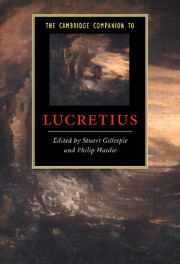Book contents
- Frontmatter
- Introduction
- Part I: Antiquity
- Part II: Themes
- Part III: Reception
- 12 Lucretius in the Middle Ages and early Renaissance: transmission and scholarship
- 13 Lucretius in the Italian Renaissance
- 14 Lucretius in early modern France
- 15 Lucretius in the English Renaissance
- 16 The English voices of Lucretius from Lucy Hutchinson to John Mason Good
- 17 Lucretius in the European Enlightenment
- 18 Lucretius in Romantic and Victorian Britain
- 19 Lucretius and the moderns
- Dateline
- List of works cited
- Index of Main Lucretian Passages Discussed
- General Index
16 - The English voices of Lucretius from Lucy Hutchinson to John Mason Good
from Part III: - Reception
Published online by Cambridge University Press: 28 May 2010
- Frontmatter
- Introduction
- Part I: Antiquity
- Part II: Themes
- Part III: Reception
- 12 Lucretius in the Middle Ages and early Renaissance: transmission and scholarship
- 13 Lucretius in the Italian Renaissance
- 14 Lucretius in early modern France
- 15 Lucretius in the English Renaissance
- 16 The English voices of Lucretius from Lucy Hutchinson to John Mason Good
- 17 Lucretius in the European Enlightenment
- 18 Lucretius in Romantic and Victorian Britain
- 19 Lucretius and the moderns
- Dateline
- List of works cited
- Index of Main Lucretian Passages Discussed
- General Index
Summary
This chapter considers the ways in which writers from the mid seventeenth to the late eighteenth century sought to give Lucretius an English poetic voice. Considerable attention will be paid to translations of the DRN, in whole or part, but the discussion will also explore the ways in which specific passages from the DRN, or the poem’s larger structures and rhetorics, were more obliquely approached by English poets. The focus is thus on specifically literary responses to Lucretius, rather than on the larger role of the DRN in disseminating Epicurean ideas in England. A distinction between ‘poetic’ and ‘philosophical’ responses to Lucretius can never be absolute, however. English poets and critics regularly affirmed their admiration for Lucretius’ ‘poetry’ while deploring his ‘philosophy’. But is it possible to write convincing Lucretian poetry without displaying, or betraying, at least some sympathy for the Roman poet’s ideas? And can English poets, whatever their philosophical sympathies, convey anything of Lucretius’ poetic quality without being themselves poets of comparable stature?
One leading translator-poet of this period, John Dryden, was convinced that successful translation depends as much on the translator’s own poetic gifts as on his knowledge of his original, and that a translator must feel some affinity with what he called the ‘genius’ or’ soul’ of the source-author. But Dryden simultaneously, and paradoxically, stressed the importance of respecting the alterity of one’s original by conveying its ‘distinguishing character’: the individuating features which crucially differentiate it from the productions of other poets, and which must be preserved if a translation is genuinely to resemble its original.
- Type
- Chapter
- Information
- The Cambridge Companion to Lucretius , pp. 254 - 273Publisher: Cambridge University PressPrint publication year: 2007
- 5
- Cited by



